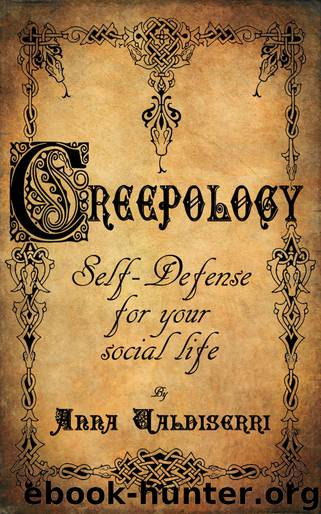Creepology: Self-defense for your social life by Anna Valdiserri

Author:Anna Valdiserri
Language: eng
Format: mobi
Published: 2017-10-12T04:00:00+00:00
The other two concerns – mistaking an innocent person for a creep and being socially punished for standing up – are linked and often stem from the same issue: the way in which women are socialized to deal with conflict.
There is no universality to women’s socialization: it is ever-changing, as well as being different in different subcultures. However, we can generalize some trends throughout our culture. One of them is that women tend to be socialized without any middle gears.
I mentioned Rory Miller’s classification of the levels of violence: nice – manipulative – assertive – aggressive – assaultive – murderous.[9] Women in our culture have traditionally been raised to be nice or manipulative in “normal” everyday interactions. Assertiveness is the mark of a “bossy bitch.” Assertiveness towards males is still seen in some corners as a direct affront to their manhood. Women who are socialized in this manner tend to respond to worsening conflict by staying nice or manipulative until it is obvious that these strategies have failed, that the situation is no longer physically safe… and then they flip out and maul somebody.
As strategies go, this has its merits: the element of surprise can work extremely well in an assault, though it does nothing to prevent it. As a strategy for dealing with social conflict, however, it’s fairly disastrous. What we’re essentially doing is not giving anyone any inkling that there is a problem – not the person with whom we have the problem, and definitely not any onlookers – and then, out of the blue, going berserk. We may be able to articulate our way out of this, to explain exactly what caused our reaction and why it was justified, but it is likely to be a tough sell. Even if we were totally in the right – if our assessment of the creep status of a person was 100% accurate and if his misbehavior warranted a stern response – the way in which we reacted is likely to make people assume that we are at least part of the problem.
In most environments, if assertiveness makes us “bitches,” going off at someone for no reason whatsoever makes us “crazy bitches.” That reputation may serve us or damages us depending on our environment, but it may not be something we want to court.
Many women fear doing anything because they fear doing too much, yet they increase their chance of needing to do too much by doing nothing. It’s a vicious circle that can only be broken by taking prompt, justified, appropriate action early on in a situation. In most situations, that “action” need be nothing more than telling someone that something doesn’t sit well with us. We don’t want them to hug us. We don’t want them to buy us a drink. We don’t want them to use our work email to romance us. And we don’t need to smash a chair on their head to convey this.
Some dedicated women's self-defense courses exacerbate this problem. Almost all of the
Download
This site does not store any files on its server. We only index and link to content provided by other sites. Please contact the content providers to delete copyright contents if any and email us, we'll remove relevant links or contents immediately.
Should I Stay or Should I Go? by Ramani Durvasula(7624)
The Lost Art of Listening by Michael P. Nichols(7456)
The Rosie Project by Graeme Simsion(6300)
Beartown by Fredrik Backman(5682)
We Need to Talk by Celeste Headlee(5575)
Ego Is the Enemy by Ryan Holiday(5350)
Hunger by Roxane Gay(4894)
Suicide Notes by Michael Thomas Ford(4790)
I Love You But I Don't Trust You by Mira Kirshenbaum(3840)
Mummy Knew by Lisa James(3658)
Not a Diet Book by James Smith(3380)
Crazy Is My Superpower by A.J. Mendez Brooks(3360)
Toxic Parents by Susan Forward(3258)
Girl, Wash Your Face by Rachel Hollis(3254)
The Complete Idiot's Guide to Coping With Difficult People by Arlene Uhl(3130)
The Social Psychology of Inequality by Unknown(2990)
Name Book, The: Over 10,000 Names--Their Meanings, Origins, and Spiritual Significance by Astoria Dorothy(2961)
The Hard Questions by Susan Piver(2950)
The Gaslight Effect by Dr. Robin Stern(2768)
